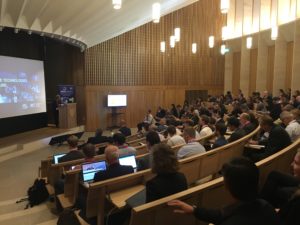 A one-day event in Oxford today is offering a unique opportunity to for healthcare industry figures from the US and Europe to engage with two of the world’s leading universities to explore the many ways healthcare will be transformed.
A one-day event in Oxford today is offering a unique opportunity to for healthcare industry figures from the US and Europe to engage with two of the world’s leading universities to explore the many ways healthcare will be transformed.
The Healthcare Technologies of the Future Conference is being jointly organised by the University of Oxford and the Massachusetts Institute of Technology (MIT). It brings together leading academics and industry figures, whether from large corporations of smaller start-ups, many of them spun out from research supported by the NIHR Oxford Biomedical Research Centre (BRC).
The conference features key opinion leaders from universities, industry leaders, and start-up company executives connected to Oxford and MIT. Attendees will have the opportunity to learn about the latest healthcare technologies, discuss collaborative opportunities over lunch, and network with academic leaders, healthcare providers, investors, and global industry partners.
The event, held in the new Sultan Nazrin Shah Centre at Worcester College, Oxford, is being sponsored by the Oxford BRC.
There will be a keynote speech from Lord Drayson, Chief Executive of Sensyne Health, which has a five-year agreement with the University of Oxford and Oxford University Hospitals to commercialise digital health products developed with research often supported by the Oxford BRC.
Maxine Allen, Head of Business Development and Partnering at the University of Oxford, said: “With delegates able to meet leading academics and business liaison figures from both MIT and Oxford, this event is a big draw. It is an opportunity to share best practice, meet potential new investors and perhaps sow the seeds for future collaborations in what is – with technologies such as AI, big data and technological genomics – a vibrant field at the moment.
“One of the vehicles that MIT use to help their start-up community engage with industry is the start-up exchanges. We thought it would be interesting to see if two leading research institutions could come together to have an influence that was more than the sum of their parts and draw more people in.”
Paul Ashley, Head of Licensing & Ventures at Oxford University Innovation, said: “The rationale behind the event was to take a look at what was best in Oxford and what’s best in MIT, and what is going on in their respective innovation ecosystems.
“We’re creating lots of really exciting companies with a variety of different technologies, which together will generate the healthcare of the future.”
Among the spin-out companies represented at the event were Nightstar Therapeutics, a clinical-stage gene therapy company focused on developing and commercialising treatments for patients suffering from rare inherited retinal disease that would otherwise progress to blindness; and Oxehealth, whose digital vital signs technology frees up clinical staff to deliver more hands-on care.